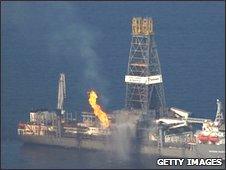BP criticism not about nationality, says Obama
- Published

Oil has been leaking into the Gulf since 20 April
Barack Obama has told Prime Minister David Cameron that criticism of BP over the Gulf of Mexico oil spill has "nothing to do with national identity".
In a 30-minute phone call, the US president said he recognised BP was a multinational company and he had no interest in undermining its value.
Mr Obama's blunt criticism of BP over the spill has prompted accusations of "anti-British" language.
Mr Cameron will visit the US as prime minister for the first time on 20 July.
During the telephone conversation on Saturday, Mr Cameron expressed his sadness at the environmental damage from the oil leak that began on 20 April.
A Downing Street statement said the leaders had "agreed that BP should continue - as they have pledged - to work intensively to ensure that all sensible and reasonable steps are taken as rapidly as practicable to deal with the consequences of this catastrophe".
It added: "The prime minister stressed the economic importance of BP to the UK, US and other countries. The president made clear that he had no interest in undermining BP's value.
"The president and prime minister reaffirmed their confidence in the unique strength of the US-UK relationship."
A statement from the White House said: "The president and the prime minister discussed the impact of the tragic oil spill in the Gulf of Mexico, reiterating that BP must do all it can to respond effectively to the situation."
President Obama's criticisms of BP - and in particular its chief executive Tony Hayward - have been consistently blunt.
And some UK businessmen have accused the president's team of using "anti-British" language when discussing the spill.
The leaders also discussed the war in Afghanistan and Iran's nuclear programme during the phone call.
No 10 said Mr Cameron and Mr Obama agreed the need for tough European Council measures to support the latest UN sanctions against Iran.
Plans 'inadequate'
Oil has been leaking into the Gulf since the Deepwater Horizon rig exploded on 20 April and sank off the coast of the US state of Louisiana, killing 11 workers.
As much as 40,000 barrels (1.7m gallons) of oil a day may have been gushing from a blown-out well before a cap was put on it on 3 June, capturing some of the leak.
In a letter to BP released on Saturday, the US Coast Guard expressed concern that the company's plans to contain the leak were inadequate and called for them to be bolstered within 48 hours.
"BP must identify in the next 48 hours additional leak containment capacity that could be operationalised and expedited to avoid the continued discharge of oil," wrote Rear Adm James Watson.
This demand comes after US Geological Survey research suggested up to 40,000 barrels (1.7 million gallons) of oil a day may have been escaping before the cap was put on - doubling earlier estimates.
Dividend suspension?
BBC business editor Robert Peston earlier reported that BP was likely to bow to US pressure and suspend dividends to shareholders.
The oil giant confirmed its directors would meet on Monday to discuss the possibility, but said no decision had yet been taken.
Our correspondent said: "It has taken a while for BP's board to reach the decision that if President Obama wants them to stop paying dividends, perhaps it would be sensible to do so.
"It is looking more likely BP will cease paying the £1.8bn of dividends per quarter it's been delivering to shareholders - until, that is it, can quantify the final bill for the oil debacle and prove it can afford those enormous costs."
He added: "Even if those costs exceed £20bn, as analysts expect, BP feels it has the resources to cope."
Share falls
Mr Cameron and Chancellor George Osborne have already spoken to BP's chairman, Carl-Henric Svanberg, about the crisis.
A Downing Street spokesman said Mr Svanberg had told Mr Cameron that BP would "continue to do all that it can to stop the oil spill, clean up the damage and meet all legitimate claims for compensation".
Mr Svanberg is due to visit the White House next week.
Conservative MP Richard Ottaway, who is chairman of the foreign affairs select committee, questioned whether the US president ought to "interfere in the operations of an international overseas company".
Mr Ottaway said: "What he has to do is separate out the political and diplomatic situation on one hand and the commercial situation on the other hand. And I think what has happened is the two have got merged here."
Shadow energy secretary and Labour leadership contender Ed Miliband said "rather than pointing fingers", the best course of action was for a "proper investigation" to be held in order to "establish the responsibilities of BP, the other private companies involved and the American regulatory authorities".
BP employs 10,105 people in the UK and it is estimated that about 18 million people in the UK either own BP shares or pay into a pension fund that holds BP shares.
The company's shares finished up 7.2% on the London Stock Exchange on Friday, recovering losses suffered on Thursday.
Its share price has almost halved since the oil spill began.